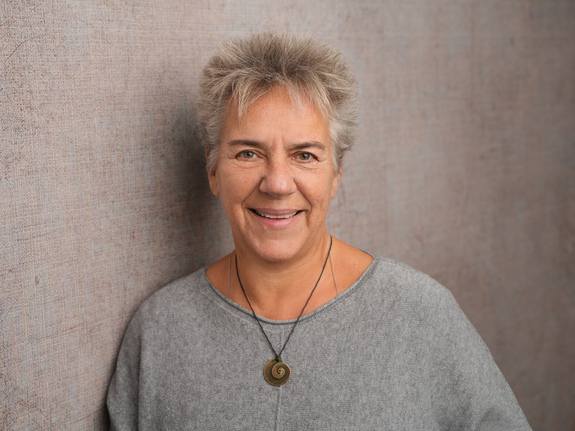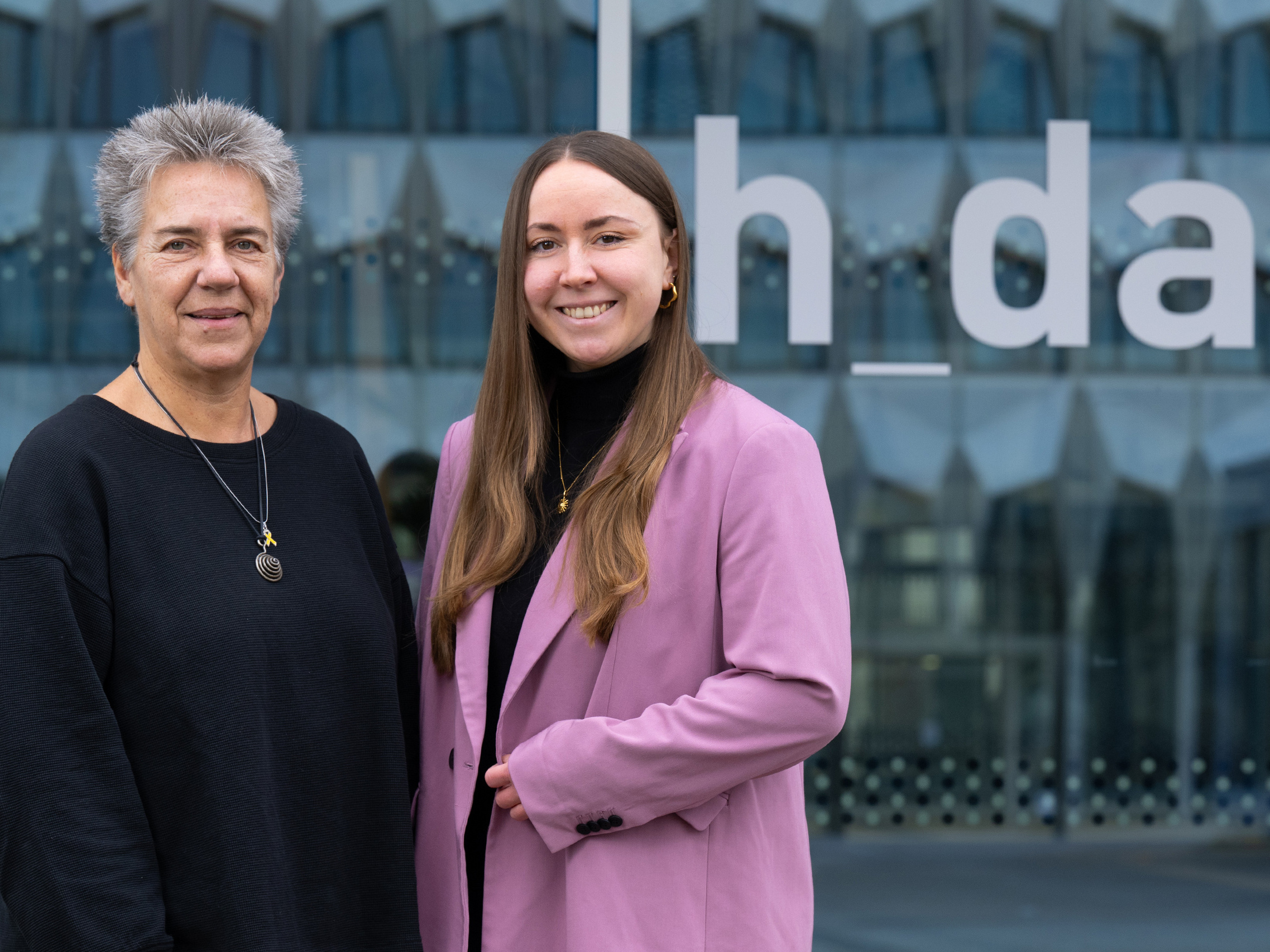Building bridges for gender equity

Although women are just as qualified, they mostly have less of a career than men. Why is that and what can we do about it? Yvonne Haffner is passionate about this topic. As a sociologist, researcher and professor at the Faculty of Social Work, she teaches and studies it. And as h_da’s Equal Opportunity Officer, it is her business to ensure equality of opportunity. Haffner’s research and practical experience show that greater gender equity is possible if you take an analytical, systematic and emphatic approach. As a result, the percentage of female professors has increased since she joined the university.
By Alexandra Welsch, 29.4.2025
The window in Yvonne Haffner’s office is wide open. A warm spring breeze wafts in, and you can hear the occasional sound of traffic from the street below. The Faculty of Social Work is situated here on Adelungstrasse, on the edge of Darmstadt’s city centre and a short distance from h_da’s Central Campus. This is where Yvonne Haffner, 59, works. She is Professor of Educational Sociology and Sociology of Gender, a highly dedicated researcher and a campaigner with a clear compass. “That women are given equal opportunities is a matter of democracy,” says Haffner, an approachable woman with short spiky hair. Her voice is warm and gentle, but at the same time resolute.
Haffner tells us that the gender issue has been her passion since the beginning of her career. Already during her postdoctoral degree, then at the Technical University of Darmstadt, she began looking at the careers of women in the STEM subjects – science, technology, engineering and mathematics. The core question: Why do women with the same qualifications have less of a career than men? Her quantitative empirical study brought some surprising answers to light.
“You need a supportive partner”
“We were able to show that it is not for the reasons generally proposed,” explains Haffner. For example, she and her team excluded women in part-time employment and discovered nevertheless that the remaining group was also less successful than men, despite having equally good training or qualifications. The real reason is the difference in circumstances: “To be able to work a bit more than others and have a career, you need a supportive partner,” says Haffner, explaining her findings. “And that applies equally for both men and women.” Men, however, are more likely to have a non-working partner at their side who takes care of their private life, in this way enabling them to invest the time required to pursue their career. “This is one of society’s structural problems,” she says. And adds: “And I think it’s still the case today.”

How this can be effectively counteracted can be seen in her many endeavours to encourage young talent and women within the university. The Equal Opportunity Office, which Haffner is meanwhile heading in her third term of office together with her colleague Julia Baumann, forms the hub. One of the milestones is the successful participation over the last ten years in the Women Professors Programme run by the Federal Ministry of Education and Research (BMBF), in which h_da has been successful once again thanks to its convincing gender equality concept. The programme covers half the costs for up to three female professors appointed to a tenured professorship for the first time. “We have so far received a couple of million euros for this,” explains Haffner. And achieved the goal of attracting more female professors to the scientific community: “Our percentage of female professors has risen – from 13% in 2013 to 24% in 2023.”
She also actively supports the next generation of academics, especially women, at the Doctoral Centre Social Work (PZS), which h_da has hosted as a joint institution with other Hessian universities of applied sciences since 2019. Haffner has been a member of the centre’s managing board from the very outset and recently supervised the first female doctoral student to graduate there. She is currently supervising four other female doctoral candidates, who are all working on gender issues. For example, one of them is conducting a quantitative analysis of the differences in the publishing practices of women and men working in social work. Another is conducting interviews throughout Germany that examine to what extent there are special services for women in drug addiction centres.
More and more enquiries
“We are receiving more and more enquiries, and interest in the doctoral centre continues to grow,” Yvonne Haffner is pleased to report. It is also registering an increasing number of external enquiries from other federal states and abroad. According to an interim report released in February, 28 doctoral degrees have been completed at the Doctoral Centre Social Work to date and 76 are currently in progress. In Haffner’s opinion, this is a tremendous development: “That the centre focuses autonomously on the science of social work gives it, in my opinion, the credit it is due.”

Working together in networks and making progress in gender equity: this is the approach she is also pursuing with the interdisciplinary “Hessen-Technikum” internship programme, which she has headed since 2013. The programme offers young women the possibility to undertake an orientation semester in STEM subjects at h_da after leaving grammar school. The background to this is the realisation that technical professions tend to be regarded as typically male and as a result female school leavers often decide against them because they feel unsure, despite being interested and talented. A winter semester long, the participants attend courses at the university one day a week, getting a taste of the respective subjects, and complete two internships in two companies on the four remaining weekdays.
More STEM students thanks to “Hessen-Technikum”
Haffner analysed the programme’s positive impact in an accompanying study based on interviews. At the heart of the study was the question of what female school students need to help them choose a subject and what is particularly effective in this context. What is needed, according to Haffner, is a “Wow!” effect: “A little taster is enough for them to be able to gauge whether a subject is their cup of tea or not.” It is possible to dispel uncertainties very quickly like this, she says. The programme also includes support measures for attracting female students from non-academic households, for example a rail pass and a mentoring programme.
Haffner’s conclusion: “The Hessen-Technikum internship programme works extremely well.” After the end of the programme, over 90% of the participants chose to study a STEM subject and are “Satisfied” to “Very Satisfied” with their current degree programme. And because it has proven successful and effective, the h_da pilot project is now being offered at all Hesse’s universities of applied sciences.
This also brings Yvonne Haffner herself full circle, as it was the lack of women in STEM subjects that originally led her to the topic of gender. Over 20 years later, she can say: “A lot has changed and improved in this area.” However, it is also clear that as a bridge builder for greater gender equity she will not run out of topics and projects.
Contact our Editorial Team
Christina Janssen
Science Editor
University Communications
Tel.: +49.6151.533-60112
Email: christina.janssen@h-da.de
Translation: Sharon Oranski